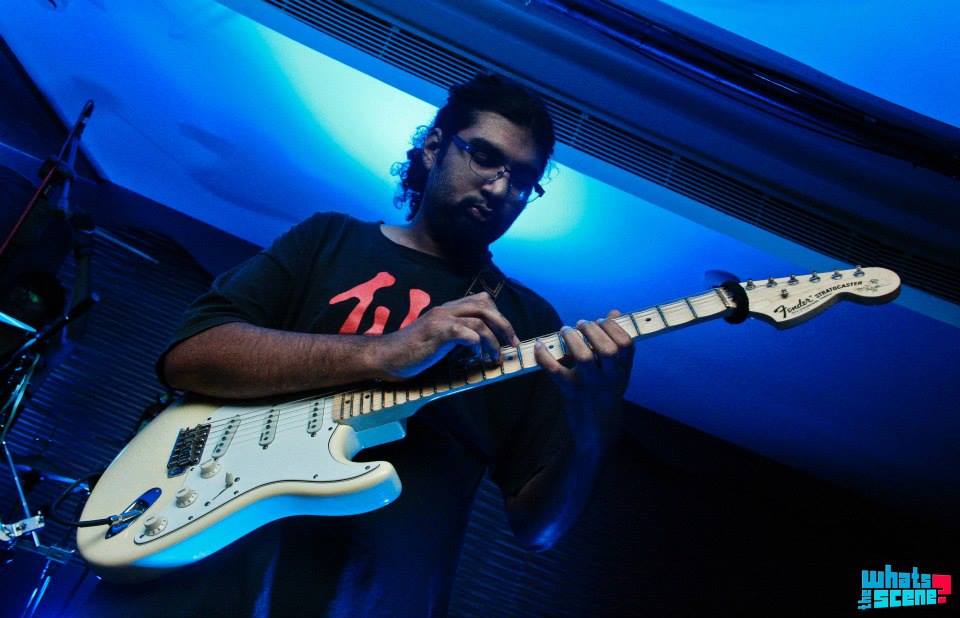Chapters
Spreading the world’s most comprehensive brain-based guitar training techniques
Hey Yo
Welcome to PsyGuitar!
PsyGuitar is about using psychology to improve guitar playing.
I’m a self-taught experimental guitarist and a published psychologist. I also consult in the L&D and EdTech space.
Started guitar at 10. Then got my first electric guitar at 15 for Rs. 9000/- ($150 at that time) with my parent’s support. Began teaching friends at 16 for my first earning.
Taught and played live as a career choice for 10 years after school. Simultaneously entered psychology. Combined the 2.
Fav guitar technique: 8 finger tapping (bass notes + melody)
Fav guitarist: Ichika Nito
OG inspiration: Joe Satriani
Origins
I played the electric guitar and composed for a heavy metal band, “Gaia’s Throne[1]” with Sci-Fi themes between 2012 and 2016. There were aliens, superpowers, mad science, engineering marvels, and a tonne of clean vocals and shred guitar.
While active on stage, I got my masters in Clinical Psychology from Pune University, India (2014), and a bonus post-graduate certification in Positive Psychology from the National Institute of Mental Health and Neuro Sciences, India (2015).
A failed learning start-up
After we disbanded, I got into the technical side of psychology for guitarists with my 2016 start-up, The OWL – Optimized Ways of Learning. My team and I used the guitar as a brain-training foundation to build a framework for learning and then conducted a few studies.
In one study, I learned something fascinating about myself! We used a neurofeedback machine to measure concentration and assessed mental arithmetic while listening to different kinds of music. I hypothesized that high-intensity death metal music would disrupt mental calculations. And it did for most. But, mine remained unchanged. That’s when I saw how much surplus attention I had to spare, and it started a journey to really get into multitasking.
Rediscovering the guitar
Since I was still on and off teaching a few students in 2017, I thought of becoming an ambidextrous guitarist just to see what new students feel because it had been 17 years since I felt that. I saw their struggles, milestones, and thought processes first-hand, even after all that extra knowledge I had. My students and I were on a similar playing field, with only conceptual knowledge as my advantage.
Or was it? My brain had already rewired itself – and we’ll explore that here.
I’ve been a righty, but I swapped the strings and started learning from scratch. It was EPIC AF; I saw the transfer effect in action. Every time I would play a few chords or simple 3 notes per string scale patterns as a lefty and then practice the same as a righty, my lefty fretting would dramatically improve. My right-hand practice automatically improved left-hand performance – the bilateral transfer effect.
A medical crisis
At the same time, unfortunately, I developed pompholyx – nasty blisters on my hand. After lots of allergy testing, I learned this was an autoimmune problem. And I just had to wait for it to go. But those blisters made it impossible for me to keep my right hand on the bridge. I tried gloves, oils, new hand positions, etc., but every time my right palm touched the strings, it hurt badly.
Innovation through necessity
Purely frustrated. No guitar. I went all out – screw this – “I am going to play the guitar with both my hands on the fretboard so my right palm stays in the air.” I trained myself in every way possible. I fully focused on becoming a 2-handed fretting guitarist and learned to multitask both hands on the fretboard. This was undoubtedly the most exciting part of my guitar career – I finally innovated out of necessity and applied my psychological training to build my skills. I became a cheap version of what Charles Berthoud does on the bass.
I soon stopped teaching in person because I wanted to reshape my career in a more psychology-centric space. But I didn’t want to stay limited to a specialization in clinical psychology (my training). I wanted everything.
So,
I started a heavy-duty psychology website called Cognition Today in 2018. My content there is featured on Forbes, CNET, Entrepreneur, and many other books and academic papers. And now that it is sustaining itself, PsyGuitar is my newest project – adding more neurons to the guitar!
Hope you have a great time here!
Do you want to help me with this brain-based approach to music?

References
[2]: https://snapchat.com/add/adityashukla77
[3]: https://twitter.com/shredwarrior
[4]: https://www.linkedin.com/in/aditya-shukla-1b8614ba/
[5]: https://instagram.com/shredwarrior
[6]: https://www.youtube.com/channel/UC28hj30REV6FfUjr64dzSVQ
[7]: https://www.buymeacoffee.com/AdityaShukla
